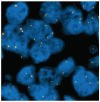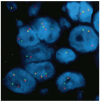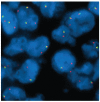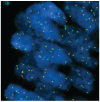Molecular testing guideline for selection of lung cancer patients for EGFR and ALK tyrosine kinase inhibitors: guideline from the College of American Pathologists, International Association for the Study of Lung Cancer, and Association for Molecular Pathology
- PMID: 23552377
- PMCID: PMC4159960
- DOI: 10.1097/JTO.0b013e318290868f
Molecular testing guideline for selection of lung cancer patients for EGFR and ALK tyrosine kinase inhibitors: guideline from the College of American Pathologists, International Association for the Study of Lung Cancer, and Association for Molecular Pathology
Erratum in
- J Thorac Oncol. 2013 Oct;8(10):1343
Abstract
Objective: To establish evidence-based recommendations for the molecular analysis of lung cancers that are that are required to guide EGFR- and ALK-directed therapies, addressing which patients and samples should be tested, and when and how testing should be performed.
Participants: Three cochairs without conflicts of interest were selected, one from each of the 3 sponsoring professional societies: College of American Pathologists, International Association for the Study of Lung Cancer, and Association for Molecular Pathology. Writing and advisory panels were constituted from additional experts from these societies.
Evidence: Three unbiased literature searches of electronic databases were performed to capture articles published published from January 2004 through February 2012, yielding 1533 articles whose abstracts were screened to identify 521 pertinent articles that were then reviewed in detail for their relevance to the recommendations. Evidence was formally graded for each recommendation.
Consensus process: Initial recommendations were formulated by the cochairs and panel members at a public meeting. Each guideline section was assigned to at least 2 panelists. Drafts were circulated to the writing panel (version 1), advisory panel (version 2), and the public (version 3) before submission (version 4).
Conclusions: The 37 guideline items address 14 subjects, including 15 recommendations (evidence grade A/B). The major recommendations are to use testing for EGFR mutations and ALK fusions to guide patient selection for therapy with an epidermal growth factor receptor (EGFR) or anaplastic lymphoma kinase (ALK) inhibitor, respectively, in all patients with advanced-stage adenocarcinoma, regardless of sex, race, smoking history, or other clinical risk factors, and to prioritize EGFR and ALK testing over other molecular predictive tests. As scientific discoveries and clinical practice outpace the completion of randomized clinical trials, evidence-based guidelines developed by expert practitioners are vital for communicating emerging clinical standards. Already, new treatments targeting genetic alterations in other, less common driver oncogenes are being evaluated in lung cancer, and testing for these may be addressed in future versions of these guidelines.
Figures




Similar articles
-
Molecular testing guideline for selection of lung cancer patients for EGFR and ALK tyrosine kinase inhibitors: guideline from the College of American Pathologists, International Association for the Study of Lung Cancer, and Association for Molecular Pathology.Arch Pathol Lab Med. 2013 Jun;137(6):828-60. doi: 10.5858/arpa.2012-0720-OA. Epub 2013 Apr 3. Arch Pathol Lab Med. 2013. PMID: 23551194 Free PMC article.
-
Molecular testing guideline for selection of lung cancer patients for EGFR and ALK tyrosine kinase inhibitors: guideline from the College of American Pathologists, International Association for the Study of Lung Cancer, and Association for Molecular Pathology.J Mol Diagn. 2013 Jul;15(4):415-53. doi: 10.1016/j.jmoldx.2013.03.001. Epub 2013 Apr 4. J Mol Diagn. 2013. PMID: 23562183
-
Molecular testing for selection of patients with lung cancer for epidermal growth factor receptor and anaplastic lymphoma kinase tyrosine kinase inhibitors: American Society of Clinical Oncology endorsement of the College of American Pathologists/International Association for the study of lung cancer/association for molecular pathology guideline.J Clin Oncol. 2014 Nov 10;32(32):3673-9. doi: 10.1200/JCO.2014.57.3055. Epub 2014 Oct 13. J Clin Oncol. 2014. PMID: 25311215 Free PMC article.
-
Reflex testing for epidermal growth factor receptor mutation and anaplastic lymphoma kinase fluorescence in situ hybridization in non-small cell lung cancer.Arch Pathol Lab Med. 2011 May;135(5):655-64. doi: 10.5858/2011-0029-RAI.1. Arch Pathol Lab Med. 2011. PMID: 21526964 Review.
-
Personalized targeted therapy for lung cancer.Int J Mol Sci. 2012;13(9):11471-11496. doi: 10.3390/ijms130911471. Epub 2012 Sep 13. Int J Mol Sci. 2012. PMID: 23109866 Free PMC article. Review.
Cited by
-
Response to crizotinib in a squamous cell lung carcinoma patient harbouring echinoderm microtubule-associated protein-like 4-anaplastic lymphoma translocation: A case report.Thorac Cancer. 2016 Apr 26;7(3):355-7. doi: 10.1111/1759-7714.12298. Epub 2015 Jul 29. Thorac Cancer. 2016. PMID: 27148422 Free PMC article.
-
Chemotherapy outcomes by histologic subtypes of non-small-cell lung cancer: analysis of the southwest oncology group database for antimicrotubule-platinum therapy.Clin Lung Cancer. 2013 Nov;14(6):627-35. doi: 10.1016/j.cllc.2013.06.010. Epub 2013 Jul 31. Clin Lung Cancer. 2013. PMID: 23910067 Free PMC article.
-
SEOM clinical guidelines for the treatment of non-small cell lung cancer (NSCLC) 2013.Clin Transl Oncol. 2013 Dec;15(12):977-84. doi: 10.1007/s12094-013-1085-2. Epub 2013 Aug 6. Clin Transl Oncol. 2013. PMID: 23918288
-
EGFR T751_I759delinsN Mutation in Exon19 Detected by NGS but Not by Real-Time PCR in a Heavily-Treated Patient with NSCLC.Int J Mol Sci. 2022 Nov 3;23(21):13451. doi: 10.3390/ijms232113451. Int J Mol Sci. 2022. PMID: 36362239 Free PMC article.
-
Current Update of Laboratory Molecular Diagnostics Advancement in Management of Colorectal Cancer (CRC).Diagnostics (Basel). 2019 Dec 23;10(1):9. doi: 10.3390/diagnostics10010009. Diagnostics (Basel). 2019. PMID: 31877940 Free PMC article. Review.
References
-
- World Health Organization [Accessed October 26, 2012];Cancer fact sheet No. 297. http://www.who.int/mediacentre/factsheets/fs297/en/. Published 2012.
-
- Miller VA, Kris MG, Shah N, et al. Bronchioloalveolar pathologic subtype and smoking history predict sensitivity to gefitinib in advanced non-small-cell lung cancer. J Clin Oncol. 2004;22(6):1103–1109. - PubMed
-
- Garassino MC, Borgonovo K, Rossi A, et al. Biological and clinical features in predicting efficacy of epidermal growth factor receptor tyrosine kinase inhibitors: a systematic review and meta-analysis. Anticancer Res. 2009;29(7):2691–2701. - PubMed
-
- Shepherd FA, Rodrigues Pereira J, Ciuleanu T, et al. Erlotinib in previously treated non-small-cell lung cancer. N Engl J Med. 2005;353(2):123–132. - PubMed
-
- Stinchcombe TE, Socinski MA. Gefitinib in advanced non-small cell lung cancer: does it deserve a second chance? Oncologist. 2008;13(9):933–944. - PubMed
Publication types
MeSH terms
Substances
Grants and funding
LinkOut - more resources
Full Text Sources
Other Literature Sources
Medical
Research Materials
Miscellaneous

